Survivor Views on Social Connection & Isolation
Overview
The American Cancer Society Cancer Action Network (ACS CAN) empowers advocates across the country to make their voices heard and influence evidence-based public policy change, as well as legislative and regulatory solutions that will reduce the cancer burden. As part of this effort, ACS CAN deploys surveys to better understand cancer patient and survivor experiences and perspectives, through our Survivor Views research panel. The panel is a group of cancer patients and survivors who respond to regular surveys and provide important insights to support ACS CAN’s advocacy work at all levels of government.
Fielded June 26-July 19, 2023, our latest survey explores the impact of cancer diagnosis and treatment on the social connections of cancer patients and survivors. The web-based survey was conducted among 1,155n cancer patients and survivors nationwide who have been diagnosed with or treated for cancer in the last seven years.
Key Findings
-
More than half of cancer patients and survivors experience an aspect of social isolation at least some of the time, and 31% report feeling lonely very or somewhat often.
- Those most likely to report higher levels of loneliness include those who live alone, people of color, and lower income earners.
- More than half experienced greater isolation as a result of their cancer diagnosis (52%) and treatment (57%). Physical symptoms related to cancer and withholding from loved ones were cited most frequently as negatively impacting social connection.
- Friend and coworker relationships are most likely to be impeded by cancer (35% and 31% felt more isolated from these groups, respectively), while patients often report feeling more connected with household members (48%) and extended family (42%) as a result of their cancer.
- Over two-thirds (68%) report finding connection among other cancer patients and survivors.
- The vast majority (89%) agree it would be helpful for friends and loved ones to have training in how to best support and connect with cancer patients. Suggested topics include things to say and things to avoid saying, how to listen, specific ways to offer help, and factual content to combat fear and misinformation.
Summary of Findings
Majority of Cancer Patients and Survivors Experience Social Isolation At Least Some of the Time
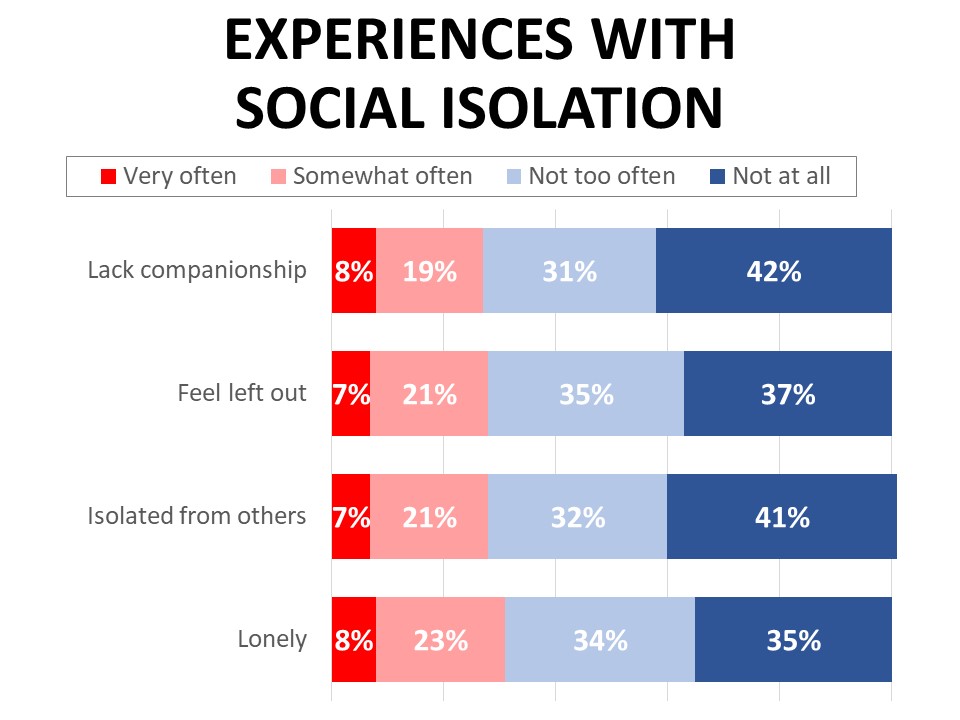
Reported levels of social isolation among respondents are generally consistent across cancer types, regional lines and regardless of whether the respondent lives in an urban, suburban, or rural community. Nineteen percent of respondents live alone, and they report about twice the rate of loneliness of those who cohabitate (46%). Higher income levels correlate with improved social connection and vice versa. Forty-eight percent of those with annual household income over $125,000 report not feeling lonely at all compared to 21% of those with under $35,000 in annual household income. While 21% of those in the under $35,000 annual household income bracket also report feeling lonely very often, only 1% of those in the highest income bracket do. Black (48%), Hispanic (44%), and multiracial cancer patients and survivors (43%) are more likely to report feeling lonely somewhat or very often than White patients and survivors (28%). Men are slightly more likely than women to report never feeling lonely at all (49% of men vs. 34% of women), but the percentage of men saying they feel lonely very often is statistically even with women (11% of men, 8% of women).
More Than Half Felt More Isolated Due to Cancer Diagnosis and Treatment
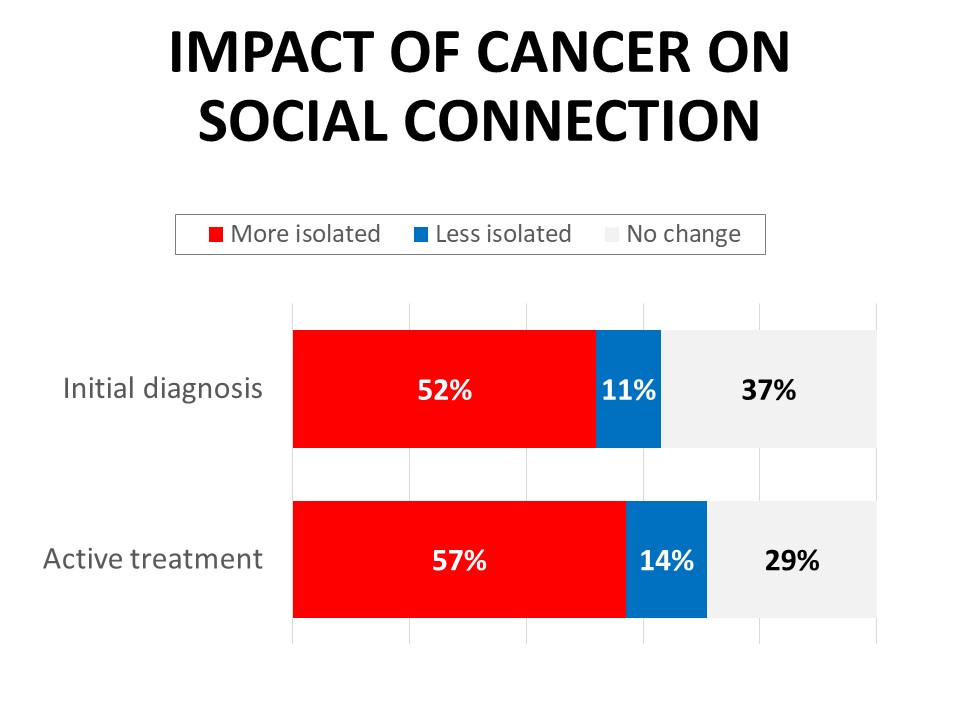
Not All Social Connections are Impacted Equally
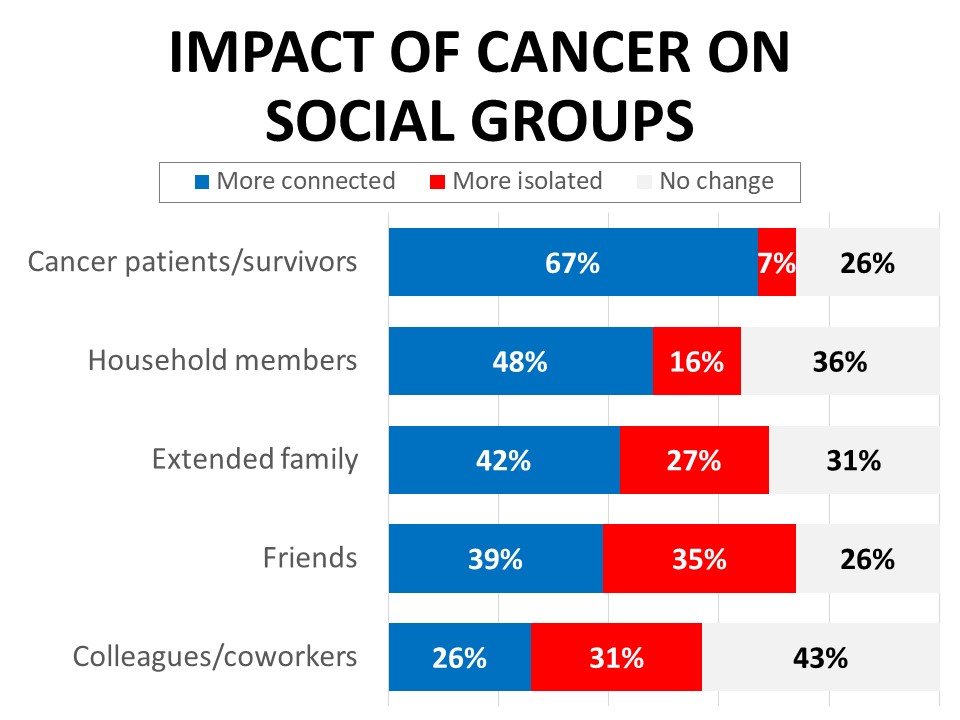
The relationships most likely to suffer from isolation are friends (35% felt more isolated from friends while 39% felt more connected) and colleagues/coworkers (31% felt more isolated from those they work with while 26% felt more connected). More than a quarter (27%) felt more isolated from extended family as a result of their cancer while only 16% felt more isolated from household members.
Physical Symptoms and Concerns About Burdening Others Hurt Social Connections Most
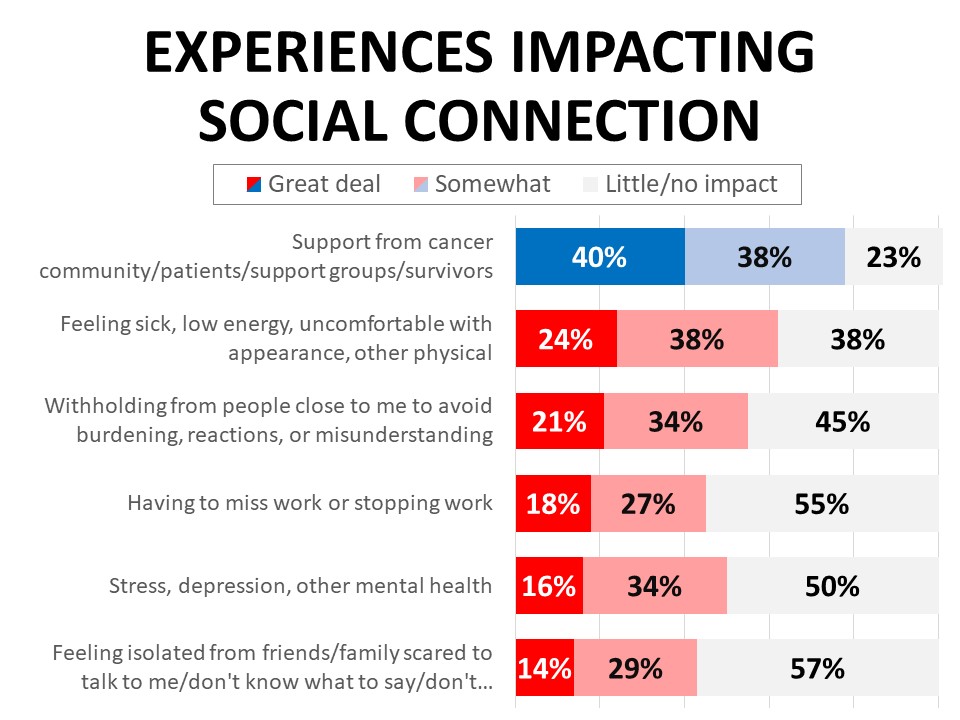
Cancer Patients and Survivors Highly Regard Training for Social Connection and Offer Suggestions
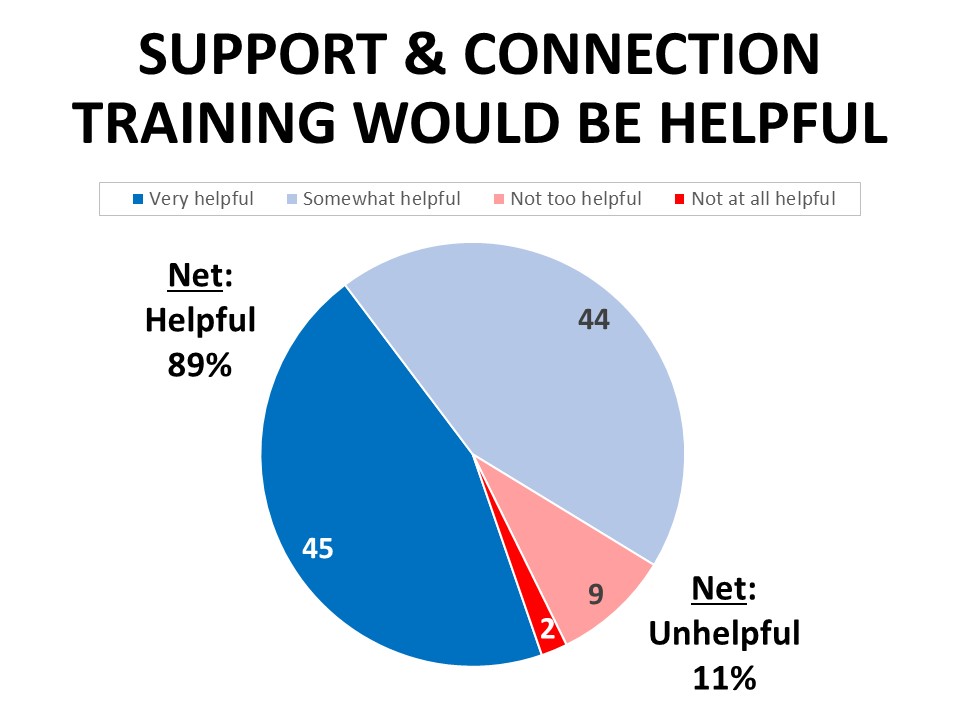
- Connecting patients and survivors, such as through support groups, online forums, or specific events/activities
- Support for caregivers and social networks of patients and survivors
- Specific content recommendations
Specific content recommendations include what to say as well as things to avoid saying, how to listen, lists of helpful tasks, and facts and expectations to help reduce fear of the unknown, stigma, and misinformation. Representative responses related to caregiver/support training are quoted below:
Question: What do you think would be the best way to improve social connection and reduce isolation for cancer patients?
“Be able to send a link to a short, simple online training course to friends and family with topics on what to say, what to do, how to "be there."
“It can be hard to think of what kind of help to ask for in the moment when someone offers. An app or page with bullet points to give to family & friends, “Ways You Can Best Support/Assist Me” or something similar with a place where the patient could write down specifics, such as do my laundry.”
“Training friends/family how to listen. I needed people to talk to openly but didn’t have a lot of that. Many people helped with food, errands, etc., but I needed to talk to my trusted circle.”
“Let them know we have a need to talk about it, NOT ignore it or pretend it didn't happen.”
“Tools to help build understanding for both friends/family and myself as the patient.”
“Teaching cancer patients it is ok to talk about what is happening and how to find people that you can candidly speak with about your situation. I found it difficult at times to tell my loved ones because I didn't want to burden them, but then they would tell me it would not burden them, it would help them take care of me better.”
“Teaching caregivers/supporters good questions to ask, things not to say, or how to just hang out in silence.”
Methodology
ACS CAN’s Survivor Views research initiative was designed to support the organization’s efforts to end suffering and death from cancer through public policy advocacy. Data provided by cancer patients and survivors as part of this project allows for a greater understanding of their experiences and opinions on cancer-related issues and gives voice to cancer patients and survivors in the shaping and advocating of public policies that help prevent, detect, and treat cancer and promote a more positive quality of life for those impacted.
To ensure the protection of all participants in this initiative all research protocols, questionnaires, and communications are reviewed by the Morehouse School of Medicine Institutional Review Board.
The survey population is comprised of individuals who meet the following criteria:
- Diagnosed with and/or treated for cancer within the last seven years
- Over the age of 18 (parents of childhood cancer survivors were invited to participate on behalf of their minor children)
- Reside in the US or US territories
Potential Survivor Views participants were invited to participate through email invitations, social media promotion, and partner group outreach. Those who agreed to participate after reviewing the informed consent information completed a brief survey including demographic and cancer history information to inform analysis as well as topical questions as discussed in this document. The data were collected between June 26-July 19, 2023. A total of 1,155 cohort participants responded to the survey. Differences reported between groups are tested for statistical significance at a 95% confidence interval.
About ACS CAN
The American Cancer Society Cancer Action Network (ACS CAN) advocates for evidence-based public policies to reduce the cancer burden for everyone. We engage our volunteers across the country to make their voices heard by policymakers at every level of government. We believe everyone should have a fair and just opportunity to prevent, detect, treat, and survive cancer. Since 2001, as the American Cancer Society’s nonprofit, nonpartisan advocacy affiliate, ACS CAN has successfully advocated for billions of dollars in cancer research funding, expanded access to quality affordable health care, and advanced proven tobacco control measures. We stand with our volunteers, working to make cancer a top priority for policymakers in cities, states and our nation’s capital. Join the fight by visiting www.fightcancer.org.
[1] Viji Diane Kannan, Peter J. Veazie. (2023) US trends in social isolation, social engagement, and companionship ⎯ nationally and by age, sex, race/ethnicity, family income, and work hours, 2003–2020, SSM - Population Health,
Volume 21. https://doi.org/10.1016/j.ssmph.2022.101331.
[2] J Zhao, JB Reese, X Han, R Yabroff. (2023) Associations of loneliness and mortality risk among cancer survivors in the United States, Journal of Clinical Oncology, Volume 41. https://pressroom.cancer.org/releases?item=122